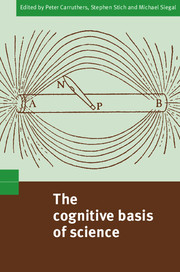Book contents
- Frontmatter
- Contents
- List of contributors
- Preface
- 1 Introduction: what makes science possible?
- Part one Science and innateness
- Part two Science and cognition
- Part three Science and motivation
- Part four Science and the social
- 15 Scientific cognition as distributed cognition
- 16 The science of childhood
- 17 What do children learn from testimony?
- 18 The baby in the lab-coat: why child development is not an adequate model for understanding the development of science
- References
- Author index
- Subject index
15 - Scientific cognition as distributed cognition
Published online by Cambridge University Press: 23 November 2009
- Frontmatter
- Contents
- List of contributors
- Preface
- 1 Introduction: what makes science possible?
- Part one Science and innateness
- Part two Science and cognition
- Part three Science and motivation
- Part four Science and the social
- 15 Scientific cognition as distributed cognition
- 16 The science of childhood
- 17 What do children learn from testimony?
- 18 The baby in the lab-coat: why child development is not an adequate model for understanding the development of science
- References
- Author index
- Subject index
Summary
After introducing several different approaches to distributed cognition, I consider the application of these ideas to modern science, especially the role of instrumentation and visual representations in science. I then examine several apparent difficulties with taking distributed cognition seriously. After arguing that these difficulties are only apparent, I note the ease with which distributed cognition accommodates normative concerns. I also present an example showing that understanding cognition as distributed bridges the often perceived gap between cognitive and social theories of science. The chapter concludes by suggesting some implications for the history of science and for the cognitive study of science in general.
Introduction
Pursuing the philosophy of science within the context of philosophy has long been justified on the grounds that scientific knowledge is the best example of knowledge there is. It is KNOWLEDGE WRIT LARGE, as the saying goes. And epistemology is one of the main areas of philosophical inquiry. Philosophers of science have tended to regard the relationship as asymmetrical. Philosophy of science illuminates the problems of epistemology, but not much the other way around.
One can now say something similar about cognition in general. Science provides arguably the best example of a higher cognitive activity. Since the emergence of cognitive science as a recognizable discipline, however, the relationship has definitely been symmetrical, if not somewhat asymmetrical in favour of the cognitive sciences.
Information
- Type
- Chapter
- Information
- The Cognitive Basis of Science , pp. 285 - 299Publisher: Cambridge University PressPrint publication year: 2002
Accessibility standard: Unknown
- 88
- Cited by
